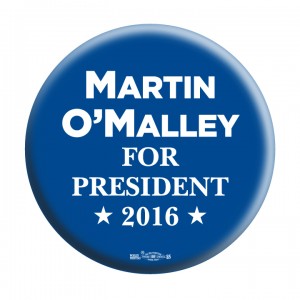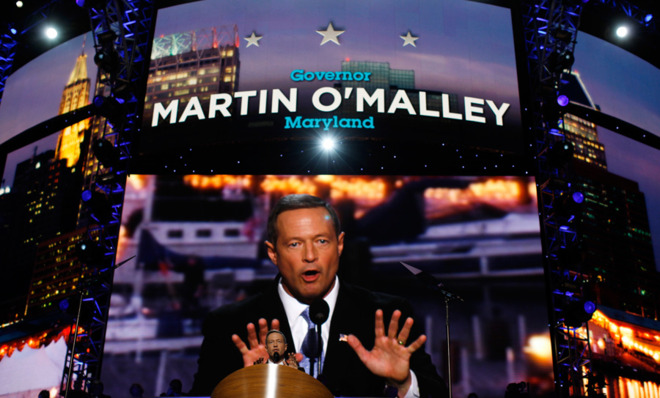If Hillary does not run, Martin O’Malley will be the next Democratic nominee
Despite some wishful thinking (“she’s sick/she doesn’t want to run”) from my fellow conservatives, every credible source indicates that Hillary Clinton will run for the presidency and, in all likelihood, win the Democratic nomination. It’s also, at this point, more likely than not that she will become the 45th president.
But in the off change that she does decide not to run or stumbles badly in the Democratic primaries, it’s not outlandish to think Maryland Gov. Martin O’Malley could be the next Democratic nominee. Hillary may overshadow the governor right now, he has a very good chance of emerging as a frontrunner if she isn’t in the race. Here are four reasons why:

Executives have a distinct advantage in presidential elections: Experience running a big operation—being an incumbent president, running a state government or commanding an army—serves candidates well on the campaign trail. Since the Civil War, only one candidate without executive experience has beaten a rival who had it. That was in 1920, when then-Sen. Warren Harding beat then-Gov. James Cox. Right now, O’Malley is one of only two governors considered among the likely Democratic candidates.
He has big-city street cred: As the only former big city mayor among the serious potential candidates on either side, O’Malley has urban-center clout that nobody—not even Hillary—can match. Democrats’ ability to win swing states like Pennsylvania and Ohio largely depends on their ability to turn out voters in urban centers. O’Malley can do that. Such voters are also important in primaries. Other Democratic candidates, including Hillary, are largely untested in this regard.
 He’s friendly with the Democratic Party’s kingmakers: To a large extent, success in the Democratic Party’s primary process is determined by one’s relationship with the major groups that make up the party’s base: organized labor, women’s groups, big-city political bosses, environmental activists, government contractors, public employees, Hollywood liberals and trial lawyers. O’Malley has been friendly with all of these groups while governor of Maryland. Many of the other potential candidates have said and done things that could ruffle the feathers of various liberal groups. Former Sen. James Webb, for example, is still haunted by comments he made in 1979 about women in the military, while among Massachusetts Gov. Deval Patrick’s accomplishments in office are deregulating auto insurance rates and professional licensing, hardly popular notions on the left. While O’Malley hasn’t thrilled all of these groups all the time, he hasn’t seriously offended any of them either.
He’s friendly with the Democratic Party’s kingmakers: To a large extent, success in the Democratic Party’s primary process is determined by one’s relationship with the major groups that make up the party’s base: organized labor, women’s groups, big-city political bosses, environmental activists, government contractors, public employees, Hollywood liberals and trial lawyers. O’Malley has been friendly with all of these groups while governor of Maryland. Many of the other potential candidates have said and done things that could ruffle the feathers of various liberal groups. Former Sen. James Webb, for example, is still haunted by comments he made in 1979 about women in the military, while among Massachusetts Gov. Deval Patrick’s accomplishments in office are deregulating auto insurance rates and professional licensing, hardly popular notions on the left. While O’Malley hasn’t thrilled all of these groups all the time, he hasn’t seriously offended any of them either.
He’s won’t scare anyone: While O’Malley holds a variety of standard-issue liberal positions that put him a bit to the port side of the median voter, he’s not cut from the same cloth as potential candidates Sens. Elizabeth Warren, D-Mass., and Bernie Sanders, I-Vt., whose broad-based attacks on free markets will alienate many. O’Malley could even draw fundraising support from hedge-fund billionaires, corporate executives and gay conservatives turned off by GOP homophobia. His efforts to restore the Chesapeake Bay and reforms the state’s commercial fishing industry might also appeal to environmentalists.
O’Malley certainly has some disadvantages going into the race. He’s not proven as a national fundraiser, has faced less scrutiny than some other candidates and lacks national name recognition. Nonetheless, in Hillary’s absence, Martin O’Malley could be considered a favorite for the nomination in 2016.

Eli Lehrer is President of the R Street Institute, a free-market think tank based in Washington, D.C. He was previously a speechwriter for the Senate Majority Leader, a Vice President of the Heartland Institute, and worked for The American Enterprise Institute and the Heritage Foundation.

